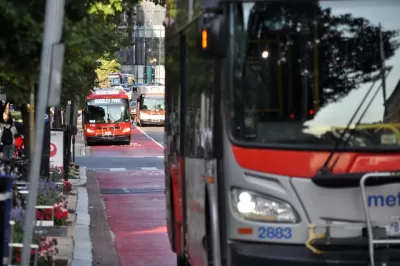Some bus lines will start letting riders board through both front and back doors this fall as part of Metro’s efforts to improve service speed and reliability.

Writing in The Washington Post, Luz Lazo reports on the Washington Metropolitan Area Transit Authority (Metro)’s announcement that, starting in the fall, Metro buses will have all-door boarding to streamline the boarding process and reduce delays.
“The initiative — set to debut in 450 buses, or about a third of the fleet, starting this year — is part of a large-scale effort to improve bus riders’ experience in the capital region,” Lazo explains. As part of the project, the agency is adding new fare collection tech to the front and back doors of buses.
According to the article, “Cities with all-door boarding have seen trip times improve substantially, with savings of up to 30 percent.” Lazo also describes other improvements Metro is making, such as allowing riders to request stops between designated bus stops at night and ticketing drivers who drive or park in bus-only lanes.
As Lazo points out, “The Washington region already experienced rear door boarding in 2020, when Metro closed off front entrances and the first few seats of Metrobuses to protect bus operators from exposure to the coronavirus.” During that time, bus trips were free.
FULL STORY: Metro will roll out all-door bus boarding this fall

Maui's Vacation Rental Debate Turns Ugly
Verbal attacks, misinformation campaigns and fistfights plague a high-stakes debate to convert thousands of vacation rentals into long-term housing.

Planetizen Federal Action Tracker
A weekly monitor of how Trump’s orders and actions are impacting planners and planning in America.

In Urban Planning, AI Prompting Could be the New Design Thinking
Creativity has long been key to great urban design. What if we see AI as our new creative partner?

How Trump's HUD Budget Proposal Would Harm Homelessness Response
Experts say the change to the HUD budget would make it more difficult to identify people who are homeless and connect them with services, and to prevent homelessness.

The Vast Potential of the Right-of-Way
One writer argues that the space between two building faces is the most important element of the built environment.

Florida Seniors Face Rising Homelessness Risk
High housing costs are pushing more seniors, many of them on a fixed income, into homelessness.
Urban Design for Planners 1: Software Tools
This six-course series explores essential urban design concepts using open source software and equips planners with the tools they need to participate fully in the urban design process.
Planning for Universal Design
Learn the tools for implementing Universal Design in planning regulations.
Gallatin County Department of Planning & Community Development
Heyer Gruel & Associates PA
JM Goldson LLC
City of Camden Redevelopment Agency
City of Astoria
Transportation Research & Education Center (TREC) at Portland State University
Jefferson Parish Government
Camden Redevelopment Agency
City of Claremont




























